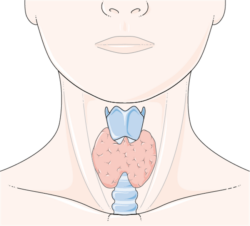High blood pressure develops for a number of reasons, with poor diet, lack of exercise and medication key contributors to chronic hypertension. Explaining high blood pressure in young, otherwise active, athletic and healthy individuals is difficult at best, but when the blood pressure seems to wax and wane for no obvious reason, diagnosing and treating this form of hypertension can be downright impossible.
This is where an good percentage of the female population find themselves; with treatment refractory high blood pressure, that worsens across the menstrual cycle, during pregnancy and in response to certain formulations of oral contraceptives. Unbeknownst to many of these women and their doctors, they are carriers of a genetic mutation that raises their blood pressure relative to circulating progesterone concentrations. For these women, when progesterone concentrations are high, as during the luteal phase of menstrual cycle, and especially during pregnancy, blood pressure skyrockets uncontrollably. When progesterone concentrations are low and provided lifestyle variables are in check, blood pressure is more manageable.
Mineralocorticoids and Blood Pressure
Blood pressure is controlled in large part by what is called the mineralocorticoid system. This is a set of both steroid and peptide hormones that interact with the vasculature and the kidneys to increase or decrease blood flow. The mineralocorticoid hormone receptors are at the center of this system. Binding to these receptors is the mineralocorticoid hormone called aldosterone. Aldosterone regulates salt homeostasis and whether the kidneys store salt and water or release it.
Sensors within the kidneys monitor sodium concentrations. When there is not enough salt, they release the peptide hormones renin and then angiotensin I and II. The renin-angiotensin system then activates the release of the steroid hormone aldosterone. Aldosterone binds to the mineralocorticoid receptors and signals the kidney to reabsorb more salt. More water is also reabsorbed, and with those changes, plasma volume increases. Increased plasma volume, increases vascular volume which in turn requires a higher cardiac output. Increased cardiac output then leads increased blood pressure. The reverse is also true, decrease salt reabsorption and we get hypotension or low blood pressure.
Regulating Blood Pressure
At every junction there can be errors or mutations in this system and compensatory reactions to environmental or dietary changes. Add those possibilities to the variety of other factors that control blood pressure (baroreceptors, natriutetic peptides, kinin-kallikrein, adrenergic receptors, nitric oxide and endothelin) and it is easy to see why hypertension is sometimes difficult to manage. Women, however, have the added bonus of constantly changing hormone concentrations, across the menstrual cycle, pharmaceutically, across pregnancy and across menopause. Since the mineralocorticoid receptors, like all steroid hormone receptors, bind promiscuously to a bunch of different hormones, it is easy to see how drastically changing hormone concentrations can impact salt and water homeostasis (premenstrual swelling, pregnancy swelling, oral contraceptive swelling), and ultimately, blood pressure. Add a little stress to this mix and we have a recipe for hypertension. Indeed, it should be noted that both cortisol, the stress hormone, and progesterone, bind more strongly to the mineralocorticoid receptor than aldosterone.
Progesterone Binds to Mineralocorticoid Receptors
Progesterone, the reproductive hormone that prepares the endometrium for implantation during the luteal phase of the menstrual cycle and supports the pregnancy once underway, binds to mineralocorticoid receptor. The relationship between progesterone and blood pressure is complex, but mostly progesterone blocks the mineralocorticoid receptors and lowers blood pressure. In some women, however, the shape of the mineralocorticoid receptor is altered, allowing for increased progesterone binding in such a way that it activates the signals sent from the receptor. So rather than block the mineralocorticoid-aldosterone pathway, it launches it. Progesterone then becomes the conduit for increasing salt and water retention and increasing blood pressure.
Progesterone and High Blood Pressure
For women who carry this gain-of-function mineralocorticoid receptor mutation, high blood pressure emerges early, before the age of 20 and, for all intents and purposes, is refractory to the normal lifestyle changes and many medications that reduce blood pressure, except perhaps diuretics. The high blood pressure often becomes severe during pregnancy. It may also become severe with any drug that increases progesterone or decreases aldosterone including with oral contraceptives, synthetic progestins (medroxyprogesterone, micronized progesterone, prempro and related), and blood pressure medications that block aldosterone (spironolactone) and are derived from 17a- spirolactone. Fourth generation progestin, contraceptives or hormone replacement therapies (HRT) containing drospirenone are particularly dangerous, as they both bind to progesterone receptors strongly and block mineralocortiocoid activity simultaneously.
It should be noted that boys and men also carry this mutation and are susceptible to early onset hypertension.
The Problem with Progesterone Mediated Blood Pressure
The problem with progesterone mediated high blood pressure is one of recognition. High blood pressure in general is not recognized in young women. Blood pressure mediated by progesterone concentrations, whether via endogenous and menstrually-related changes or the use of synthetic progestins, is all but completely unrecognized. Genetic testing in this population is unheard of. Consequently, many young women are at risk for cardiac and thromboembolic events and do not know it. Could the sudden deaths reported in association with drosperinone oral contraceptives be related to unrecognized gain of function mineralocorticoid mutations? Possibly.
During pregnancy, the risk is magnified exponentially as progesterone concentrations increase several hundred fold. Hypertension accounts for 6% of all pregnancy complications, one wonders what percentage are related to progesterone? No one knows, because it is not studied.
For older women, though blood pressure is routinely monitored, connections between synthetic progestins in HRT and blood pressure elevations may only be cursorily understood, leaving many women open to inadvertently increasing their risk for heart attack and stroke coincident with attempts to manage menopausal symptoms. Although, hormones naturally decline during menopause, the re-supplementation of progesterone and progestins can be problematic for these women.
Fourth Generation Progestins: The Dangers of Drospirenone
For women with the gain of function mutation, certain forms of oral contraceptives and HRT can be deadly. The 4th generation progestins contained the Yas, Yasmin, Ocella series of birth control pills and in the Angeliq brand of HRT, are derived from a synthetic progestin that blocks the mineralocorticoid receptor directly.
Drospirenone is a progestin and mineralocorticoid antagonist derived from 17a- spirolactone. 17a- spirolactone blocks aldosterone. Under normal circumstances, blocking aldosterone’s ability to bind with mineralocorticoid receptors might be a good thing and reduce high blood pressure, particularly in folks who have aldosterone based hypertension or who are in heart failure. In other populations, however, blocking aldosterone might not be such a great idea.
Drospirenone based oral contraceptives and HRT formulations contain progestins that bind with equal affinity to the progesterone receptor compared to endogenous progesterone, but bind 500X more strongly to the mineralocorticoid receptors than aldosterone. This is problematic for most women, even if they don’t carry the gain-of-function mutation. Drospirenone based contraceptives increase the rate of serious cardiovascular events by as much as 6X compared to the older contraceptives. In women who carry the gain of function mineralocorticoid receptor mutation, taking a drosperinone based oral contraceptive or menopausal replacement therapy, the results can be deadly.
Drospirenone – Mineralocorticoid Receptor Connection
If one has the gain of function mutation, where the mineralocorticoid receptors preferentially bind with progesterone and its metabolites, blocking what remaining aldosterone controlled feedback loops of salt/water balance, skews the receptor activity in such a way that it is always on, and always telling the kidneys to reabsorb more salt and water. Similarly, increasing progesterone concentrations unnaturally, with drosperinone, or any other progestin, quantitatively increases binding with the mineralocorticoid receptors, displacing aldosterone, removing important feedback controls and creating a state of perpetual progestin-mineralocorticoid activation.
Epigenetic Factors in Blood Pressure
Environmental toxicants and pharmaceuticals induce what are called epigenetic changes in protein expression. Epigenetic means beyond genetics. These types of changes don’t alter DNA per se, just alter whether a certain protein codes are activated or deactivated. There are number technical mechanisms by which epigenetic variables can alter receptor expression and function. For other receptors, especially the glucocorticoid and estrogen receptors, many of these epigenetic mechanisms have been elucidated. Not so for the mineralocorticoid receptors. Certainly, with environmental exposures, which are all endocrine disrupting in some manner or another, it is possible to create constitutively open mineralocorticoid receptors, much like the gain of function mutations. This would mean that millions of women could be a great risk when using drospirenone based oral contraceptives or HRT, progesterone increasing or mimicing drugs (most oral contraceptives and HRT), aldosterone blocking agents from spirolactone and during pregnancy. Even across the menstrual cycle, blood pressure would be expected to wax and wane relative to circulating progesterone concentrations.
Final Thoughts
Maybe it is time to move beyond the one hormone, one receptor, one function view of endocrinology. It’s certainly time to address the role of cycling hormones on human physiology. Cycling progesterone concentrations impact blood pressure; recognizing this simple fact would help women and their physicians develop more reasonable and effective approaches to managing high blood pressure.












Hi Dr Marss: Could you please indicate where I might be tested for the mutations to the MR L810 snp. Any other tests for Progesterone Mediated Blood Pressure?
Kind regards,
I am 55 yrs of age and post menopausal. I have always been very health conscious with food and exercise. Since menopause, I have watched my BP go up. There is a family history of breast cancer and I chose not to take HRT but opted to try bioidentical HRT cream which has not helped at all. Currently, I am meditating and have seen my BP go down which is good but I’m still concerned and would like to alleviate hot flash symptoms. What do you recommend?
I had pre-eclampsia with both pregnancies. Doctor said I shouldn’t take oral contraceptives due to that but said Mirena was fine because it was progesterone only. I had Mirena less than two weeks and was severely ill. Went to gym who took my BP and immediately removed the Mirena. I was better in the next couple of days. Started to get extremely dizzy and fired at the start of my period and noticed my blood pressure was spiking to about 170/ 115 whole that was happening. Doc had me take it daily for a couple of months. It was mainly 130/90 but jumped to dangerous levels at the start of my period. I now have been dx with adenomyosis and docs want me to try Mirena again. They say there is NO way it can make my blood pressure go up because if it progesterone. I won’t do that bit am looking at hysterectomy as my only alternative. I don’t know if they will want me to take HRT or any other hormones and am now very worried about how to proceed.
I just turned 40 this past August and I have the same problem. For years now I have suffered from debilitating migraines every month just around my period.Once my period comes I already know to be on the look out for the spike in blood pressure. I have seen so many doctors and I have the feeling they don’t really believe my symptoms, they just prescribe bp meds. I’ve tried so many different supplements over the years to try and manage my hormones but nothing has ever helped sometimes it has even made it worse. I’ve tried dim, vitex, progesterone creams, hormone balancing natural supplements and nothing has ever worked. I have taken them for a while to give them time to take affect and still nothing. I’ve had blood work done to see if my thyroid is the problem and it comes back normal. I’ve done so much reading to try and find the answer to this monthly struggle. The anxiety, and stress these hormone imbalances bring to my daily life are so debilitating. The struggles with having a bp of 117/76 one day and another day spiking 170/100 and not being able to lower it even with the bp meds. I also tried the mirena because I was told since it was progesterone it would not affect my bp. It was the worst 7 days of my life. That same day I got it by the afternoon my bp began to spike I felt hot all over and my head felt as though screws were being drilled into my brain. Nothing would lower the pain in my head it was a constant level 10. I was popping naproxen sodium pills of 500mg to ease the pain and nothing helped. I ended up going to to the ER and even with the meds I was given intravenous the pain was still at about a 7 and the lowest my bp would go down was in the 145/85 range. The next day I went to the gynecologist and had it removed. 2 hours later at home I took my bp and it was 97/65. I will never forget those 7 days of hell! I walk everyday and eat very clean and I know it helps, but once those hormone changes kick in it doesn’t matter the bp is still very hard to manage. This sense of depression and despair sets in and I loose all hope of one day having a normal back in my life. I have thought about having a complete hysterectomy to see if that would resolve the issue, but when I’ve brought it up to my doctors they just discourage me and tell me it’s an unnecessary procedure. I hope someone out there finds the solution to what I now see is a big problem for a lot of woman. I hope we all find the cure or some type of solution to this nightmare.
Try to look into a Uterine Ablasion. It was an absolute miricle for me! Vrs.getting an hysterectomy. No periods, no pain. Anymore…
I had high blog pressure last month of my pregnancy 13 yrs ago and have been fine since then have been on progesterone for a month now and I’m having hypertension past two days ?? Does that mean I can’t take progesterone?
Possibly. Stop the progesterone and see if the BP settles down. Then you’ll know.
Hello, I have been researching on this for the past 6 years. I was 25 when I removed my contraceptive implant and got pregnant soon after that, I suffered with severe preecclempsia and lost the pregnancy. My blood pressure never really settled after that , I went on to have a few more pregnancies and suffered high bp in all of them, I was prescribed labetalol which is a beta blocker and nefidipine which a calcium-channel blocker. Can you tell if those medicines are doing any good or causing more damage?
Diane, it really depends upon what the cause of the high BP is. If it is relative to progesterone, no, they won’t help. If the high BP is relative to high aldosterone (another hormonal issue), then those meds won’t help either. I would consider investigating further. It will be difficult though, because few physicians know anything about this. In fact, we’re running an article on Monday who had hyper aldosterone induced blood pressure problems and it took her 15 years to get a diagnosis and the correct treatment.
Indeed I would like to get to the bottom of this but it is difficult to investigate. In fact I’m currently looking for people such as yourself who have specialized on this subject here in the UK. I have to indicate that on my 3rd pregnancy (which was one out of my two successful pregnancies) I started taking progesterone pessaries from the 2nd trimester (due to incompetent cervix) all the way to the end of the pregnancy and I didn’t notice any change in my bp until the third trimester when it started creeping up, so I’m interested in hearing more about the study on high bp related to high aldosterone.
My blood pressure goes up about a week before my period and goes back down after. It is normally 120/60 and a week before will rise to around 150/100. I’m 49 and this has been happening for about a year now.
Same here. High BP caused me to have anxiety disorder. Now i realized its the fluctuating hormones. I feel very odd when bo is high and i get scared. Feels like having a heart or a stroke. Then i realized looking that this happens at the start of the lutial phase. I was 47, i even lost my job. Not working fir 3 years now. Im evennafraid to go back to wirk. Now that I know better I’m actively applying for jobs. I tried a lot supplements. I think help is the b vitamins and the fenale support formula which has got valyrian.
High BP caused me to have anxiety disorder. Now i realized its the fluctuating hormones. I feel very odd when bo is high and i get scared. Feels like having a heart or a stroke. Then i realized looking that this happens at the start of the lutial phase. I was 47, i even lost my job. Not working fir 3 years now. Im evennafraid to go back to wirk. Now that I know better I’m actively applying for jobs. I tried a lot supplements. I think help is the b vitamins and the fenale support formula which has got valyrian.
Hello Mrs.Marrs,I am glad I saw this page.I am having the same problem like what everybody saying here.My blood pressure before,during and days after period raised very high to 160/110 that makes me really scared.I always landed to the hospital and doctor will just prescribed me blood pressure pill.I have to tell her that high bp only happy during menstrual cycle but she never listened to me.I don’t want to take pill for the rest of my life.I am researchingwhat and helping myself on what to do.I think I just need some good supplements to balance my progesterone level.It is my low progesterone level that causeI my bp spikeko to the highestnew level.
It could be, but not by the mechanisms discussed in this particular article. Here, it’s the high progesterone that causes the problem, so blood pressure is elevated late in the cycle when progesterone is high. When you menstruate, however, progesterone drops and estradiol picks up. So you may be sensitive to the estradiol. Similarly, if you using any form of hormonal birth control, the synthetic hormones tend to spike BP by multiple mechanisms and at different times. If you are using a hormonal birth control, stopping that would be my first suggestion. Similarly, the synthetics tend to deplete a lot of nutrients, the B vitamins in particular, but also D, magnesium (which also happens to lower BP quite well), so I would begin there.
What multi vitamin would you suggest for woman with obesity caused by hormone issues from PCOS caused by insulin resistance making it almost impossible to lose weight. High BP resulting from infertility shots over 3 years. Body kept producing baby but progesterone levels would drop and baby was miscarried. Went through 1 round of chlomid and only produced 1 egg. Lost baby. Doctor bumped Chlomid up to max level for second round and produced 2 or 3 eggs. Baby produced but levels dropped again and baby lost. Took a few months to decide if we would start injections… Started with Gonal F. Same result. Baby lost. Tried again, baby lost. Increased dosages of hormones, same result. Minimal eggs produced, baby lost due to levels dropped out. D&C done to check for blockages or endometriosis related scar tissue… Nothing found. Clear as a bell. Just enlarged, smooth, white ovaries that confirmed the PCOS diagnosis. Waited for a bit to recoup from that procedure. Then, I was started on two types of hormones for a few rounds. Same result. Dr was VERY frustrated and I was literally feeling defeated emotionally and physically from all the drugs and miscarriages. Final resort was a last round simulating IVF. Shots to bring up and level off hormones first plus nasal spray used to shut off the brain message to my female organs to achieve same thing. Blood work every other day to check hormone levels. Once hormones stabilized, two different fertility drugs added to this process in order to produce as many eggs as possible. Finally created about 8 eggs – most created in the whole 3 year time period. Insemination occurred and progesterone shots continued until pregnancy was considered no longer in danger of levels dropping. Lost 1 of the 2 eggs that initially attached. Other one holding on for dear life. Diagnosed with weak cervix and put on bed rest during 1st trimester far enough along that sewing up the cervix was considered too risky. Not far enough along to have a “viable fetus” if born early. We made it to first goal and received the steroid shots to help develop the lungs if born early. Second set would be an option if we made it that far. Every day was touch and go. Made it to the second steroid shots and overnight my BP skyrocketed. Ended up in hospital with severe preeclampsia and was admitted to be watched for premature birth. Cervix down to less than 1mm and baby struggling to grow plus my BP dangerously high… We held on each day. Put on meds to help BP. Baby stopped growing around 31 weeks so doctors decided to take him via c-section. He was hours before 32 weeks when they finally took him out. BP didn’t return to normal once baby was born and hasn’t been good since. Spikes when my period starts and only goes back down when cycle nears its end. Since the fertility experience, can’t take birth control of any sort. BP skyrockets. Some meds given caused extreme heart bum spikes and sweats like I just finished a marathon race when just sitting. I stopped all but 1 of the meds they had me on over 3 months with a different doctors care. Now only on Losartan and normally only need it when my cycle comes each month. Can’t lose weight to save my life. Tried training in the gym like I always used to but after the fertility stuff, nothing is like it was. Was very athletic and no BP issues. Now fatigued, migraines, weight gain, dizziness, anxiety, depression, high BP, shortness of breath and feeling like someone is sitting on my chest. Can’t lay flat in bed to sleep and not getting good sleep. Some nights, I can’t sleep at all. So, what good multi vitamin should I start with other than the paleo oriented diet suggested above? I have GOT to find a way to turn this around and metformin is NOT an option. Was on that with the chlomid and it was AWFUL! Any help is greatly appreciated.
h, Amanda
I went through 6 clomid cycles,7 IUI,3 IVF, one miscarriage at 14 weeks resulting DnC.
I stopped doing anything for baby in 2015.But for last two years i m also suffering from high BP before my period, anxiety ,palpitation, Breathlessness, brain fogging, multiple , unexplained problems like sudden allergy onset, headaches, muscle weakening, fatigue, forgetfulness , and so on.
no body tells u side effects of infertility treatment.nobody has a clue.I would suggest
get a job to engage u, eat healthy ,add protein and omega 3 and B complex.Do yoga(no power yoga, just plain indian yoga,no western modification) , deep relaxation tech, have a body massage once a while, learn good breathing tech from a expert. do not overwhelm urself.
Thank you, I am 52 and have been experiencing episodes of extremely high BP and debilitating symptoms. They start on day 1- 4 of my cycle until day 15-16. Then I am fine until the next cycle. But my cycles are getting shorter and shorter. I had high BP in pregnancy and did not tolerate the pill. My renin is low, and aldosterone on the high side of normal. Aldactone does not help at all. I have been told that this is a psychiatric disorder and been prescribed antidepressants , which made me feel worse. I have seen several endocrinologists and a gynae, even a neurologist who have given up with a diagnosis. I feel that any sugars make it worse. Any advice? I am quite desparate.
Natalya, I suspect you have something different going on, as the pattern would be reversed if you carried the progesterone mutation. Your BP would be high in second half of your cycle and not the first. However, low renin and high aldosterone are signs of indicative of a couple of syndromes: https://www.ncbi.nlm.nih.gov/pmc/articles/PMC3475896/. I have no experience in this area, however, I suspect the increase in estradiol that occurs in the first half of the cycle may be exacerbating it. Regardless, this is who I would suggest you get in touch with or someone associated with him. https://medicine.yale.edu/genetics/people/richard_lifton.profile. I do not know him personally, have never met him, but have followed his research for years. His group discovered the gain of function mutation in the progesterone receptor that I wrote about in this post. Hope this helps. Good luck. If are able to figure this out, please, come back and let us know. I suspect there are many more women like you that would benefit from a diagnosis.
You do not distinguish between bioidentical progesterone and synthetic progesterone. These hormones are very different in their structure. For example:
https://images.duckduckgo.com/iu/?u=http%3A%2F%2Fcyclebalancecream.com%2Fwp-content%2Fuploads%2F2012%2F01%2FCBprogesteroneproveramolecules1.png&f=1
The problem with most HRT is that synthetic progesterones are prescribed and they do not have the same effect on the body as bioidentical progesterone.
Unfortunately the literature often makes it unclear which hormone is being discussed.
In fact I did. Women who carry this mutation have a problem with their own endogenous progesterone, suggesting that they would have a problem with bioidenticals as well. They likely have problems with the synthetics as well, but especially those of a drosperinone base.
Thanks for this article. I’m 50 and take HBP meds. I didn’t have HBP until I hit perimenopause, and had a lot of heaving bleeding issues. I recently got put on daily progestin (which helps with the bleeding), but holy hell, I just had the CRAZY highest BP reading of my life at the doctor yesterday 190/100! (I’m usually in the 130/80 range) and I thought of what drugs I’m on now and what’s changed — and so I googled “Progesterone and High Blood Pressure.” Bingo. Found you. Now I’m wondering if I have this mutation because I had pre-eclampsia when I was pregnant (so did my grandmother in both pregnancies). I’ll forward your article to my doctor. I hope someone funds research in this area. Now I think I’ll get off progesterone and see if the BP improves. (Dr. put me on a higher does of HBP meds, which sucks!) Thanks.
Tracy, you’re welcome. The same thing happened to me. Always battled high BP cyclically, never new why or connected the dots until much later. Had preeclampsia too. It wasn’t until a doctor put me on micronized progesterone and my BP went through the roof, landing me in hospital that I began to investigate. That is when I stumbled upon Dr. Lifton’s work (cited/linked in the post) and was able to figure it all out. Good luck.
Thanks so much for the reply! I’m not the only one! Hope future research looks into the pre-eclampsia link.
You might be interested to look at the work of Dr. Ray Peat. From his bio:
“I started my work with progesterone and related hormones in 1968. In papers in Physiological Chemistry and Physics (1971 and 1972) and in my dissertation (University of Oregon, 1972), I outlined my ideas regarding progesterone, and the hormones closely related to it, as protectors of the body’s structure and energy against the harmful effects of estrogen, radiation, stress, and lack of oxygen.
The key idea was that energy and structure are interdependent, at every level.
Since then, I have been working on both practical and theoretical aspects of this view. I think only a new perspective on the nature of living matter will make it possible to properly take advantage of the multitude of practical and therapeutic effects of the various life-supporting substances–pregnenolone, progesterone, thyroid hormone, and coconut oil in particular.”
And you might want to read this article on Heart and Hormones:
http://raypeat.com/articles/articles/heart-hormones.shtml
She never replied? Hmmm… Wonder why?
A question for Chandler Marrs, I would greatly appreciate thoughts you may share.. is there any information or data that would suggest how lasting are the effects of progesterone therapy on blood pressure/hypertension for women with the gene mutation?
In 2007 when I was discharged from the hospital after the c-section in 2007 my post-delivery blood pressure was elevated 200/100 range, weight 165lbs and remains in that range w/o bp meds,
Currently, on a day-to-day basis my BP averages 186/104 w/o bp meds. I weigh 155lbs, 5’5, low salt/refined sugar, vegan diet. I often skip breakfast. 45 minutes of cardio fitness exercise 3x’s per week. I just turned 50, my period has been frequently absent and is absent now since April 2016 thru Dec now. I m sched today for biopsy of uterine lining due thickened and no period.
Any information on how lasting the affects of progesterone therapy on someone with the gene mutation or ways to confirm the presence of the gene mutation? is its affect permanent? I did loose a few pounds but I would give up most anything to see my BP stabilize in a healthy range.
Gail, I don’t know if there is any research on the residual affects. There are links in the article to the researcher who discovered this mutation, you might consider reaching out to him for testing. I do not know him personally, just his research. Secondly, carbohydrates increase BP, you might consider a more paleo oriented diet w/ more fats and proteins, vegetables and fewer processed carbs like breads etc. You might also consider increasing salt and decreasing sugar. Contrary to popular belief, it is the sugars that skew metabolism and BP while salt is necessary. Lower salt is often associated with high BP (we have articles on this). Finally, read up on mitochondrial health, we have lots of articles on the topic. If you feed the mitochondria, everything else seems to fall into place. Good luck.
I have suffered from difficult to control hypertension for years but strangely the only time my blood pressure was normal was during both my pregnancies .
I cannot have HRT,I am told, but wonder if in my case it may be benificial ? As progesterone is also a vasodilator might it not be better than other recommended medication?
HRT would not be recommended as it would increase your blood pressure. Synthetic hormones, particularly the estrogens increase BP. In most women, progesterone decreases BP, but in some women, b/c of a particular mutation, it will increase BP. If your BP was good during pregnancy, it could be hormonal, there are several hormones involved, but it also could be general nutrition. We tend to take better care of ourselves when pregnant than during any other time in our lives. What we eat has a huge impact on BP.
I’m so glad to read this! I’ve always noticed my BP goes up and down in a very predictable pattern around my menstrual cycle. My BP was a major issue in my pregnancy and I had to deliver 3 1/2 months early. So my question is, what do I do about it? What’s the treatment?
I had a similar experience, hence the article. I don’t know that there is a lot research on the topic. The mutation is considered rare and so very few even know it exists. Certainly, during pregnancy and normal menstrual fluctuations there may not be a lot that can be done, but I would suspect that using hormonal contraceptives and/or any synthetic hormone – with a progesterone or medications with mineralcorticoid component should probably be avoided. Beyond that I really don’t know. I have managed mine more or less with diet and nutrient supplements that support mitochondrial function.
Great article! Just wondering which nutrient supplements you take to help manage your BP? Thanks!
I generally eat well these days, only organic, mostly proteins and vegetables. Previously, even though I ate better than most, I tended to eat a lot more processed foods than I should have. So that is first. Second, I exercise regularly and have all my life. Those two components are critical to health and no amount of supplements will correct a bad diet and sedentary lifestyle. As far as supplements, I take, a good multi, in addition to vitamin D, vitamin B1, magnesium, coQ10, alpha lipoic acid, fish oil, l-carnitine, biotin, vitamin A (be advised, this one is fat soluble, so you can take too much). I think that is it.
I’m so glad I stumbled on your site. I have been dealing with this health problem for over a year and recently has gotten worse. For the last 3 months I have gone to the ER twice for hypertension, I had to call 911 twice as I experienced it while driving. All test came back normal and was just given medication for anxiety and migraine. I started to take note of things to find out what triggers and noticed that my blood pressure spikes around my menstrual cycle usually after. I am very desperate to get help especially when doctors say this is just stress related and it’s all in my head. I am 47 years old and is menopausal probably. I have medication for HBP but It could still go up to 170/110. I can’t keep on taking lorazepam or xanax. Please help!
Your description of symptoms is very similar to what I am going through right now.
I am also 47 years old and experiencing perimenopause. My blood pressure goes up significantly right after my periods, which by the way, tend to be very heavy. All blood tests are normal and I have been to a primary doctor, cardiologist and OBGYN. My primary doctor has me on Irbesartan and Atenelol. The Atenelol helps with anxiety that occurs when my blood preessure rises. Even with the meds, my readings can climb into the 180’s/90. I am an avid bike rider and eat well. I have no idea what is happening and very concerned.
I have been doing bio identical hormones as an implant that include progesterone,testosterone and estrogen. They helped me a lot with mood changes, joint comfort and more energy. I am 65 and last year I started bleeding so they put me on two night supplements of progesterone called troches which is 150mg at bed time. I am experiencing high blood pressure and my doctor has put me on meds for it. Just started blood pressure medication but my numbers fluctuate a lot and wondering if I need to discontinue the implants or is there something else I can do? Hate to give the implant up because of how it has improved my quality of life but don’t want to jeopardize my health for it. The added progesterone at night was to curtail the bleeding.
I decided to follow my OB’s recommendation to do Progesterone injection 7 years ago. BP was normal 120/80 and consistent throughout my previous 4 pregnancies only concern was I tended to deliver up to 3wks earlier than due date. After series of weekly progesterone shots to avoid preterm birth, my blood pressure shot up, baby experiencing low oxygen, resulted in c-section. I was discharged from hospital on schedule with bp still elevated in 200/100’s. I still struggle to get and keep my blood pressure down. Random check at work found bp 217/112 approx 3years ago. Started doing research found life methods can help – mild cardio, adequate rest, nutrition/water figure out nutritional deficiencies and remedy. Magnesium, Neprinol, b complex, k2, iron if deficient – I was, a good multi-vitamin w/green profile ie. women’s Alive, chlorella, evening primrose and omega 3 fish oil and patience. Some days I am at 160/97, others 135/90 without bp meds which seem to make bp higher with other side effects more prevalent…shortness of breath, unwanted hair growth, darkened skin patch in breast area, missnig periods, stubborn visceral weight, leg swelling, uncontrollable fatigue, cough, uncontrolled bp and others? Wish I had more answers from physicians, but the only approach seem to be to through pills at the situation. Weight still stuck but lost 7lbs since w/o bp meds and using remedies listed above. I have much more energy now, I no longer fall asleep at work!! Just want to reiterate, I never had issue with bp until after admin of progesterone shots in pregnancy and I appreciate the article for shedding some light. Are there effective ways to reverse effect post progesterone therapy?
I have had a similar experience! During my third pregnancy I was given weekly progesterone shots to prevent preterm delivery. I have never had an issues with BP before, in fact mine has typically been low. I ended up with high BP towards the end of my pregnancy and continued to deal with it after. I have a friend in a similar situation! I suspected the progesterone shots but wasn’t sure. I would be interested to know how many others are in a similar situations!
Thanks so much for this information and for all your wonderful research. I developed highish BP after a year on HRT and stopped it gradually. After a course of strong NSAIDs for arthritis I developed an inflamed throat and lungs and my doctors put me on several antibiotics in a row to which I reacted severely with my BP swinging my frantically from very high to very low. At the ER I was dismissed as an ‘over anxious hypochondriac’ in spite of having worked for decades in mental health nursing and gaining a PhD I. Research, as well as having successfully raised four kids! I suspected it was some kind of endocrine storm and I went into sudden menopause, now my BP is oddly low and I have a kind of low grade but persistent depression. I suspect progesterone dominance for I don’t think I’ve much estrogen now and wonder if you have any pointers that might help me understand this? I read recently that new peptide research has identified a substance that lowers progesterone? Thanks again for this great blog and I am now catchy my up with all your other posts 🙂
Hi there,
The last 5 months I have been doing infertility treatments. Also during this time I have developed high blood pressure. I have never had an issue before and it doesn’t run in my family. I also have dropped 34lbs was at an amazing BMI, very active, and just turned 33. I personally feel all the meds trying to jumpstart my fertility(which we have male factor so I wasn’t the issue) has resulted in my high blood pressure but the IVF specialist doesn’t seem to make the connection. I just did a round of IVF and I’m taking 700mg of progesterone suppositories daily. I feel my blood pressure rising abd I called today and the nurse said we would have to way the pros
and cons before stopping it because I could possibly loose the baby if we stopped them because I wouldn’t be producing enough from all the previous injectables. This study does make so much sense to me and I feel is very valid. I’m wondering if once I stop progesterone if my hypertension will subside.
Ashley, if it is the progesterone, your BP should go back down. I am not an expert in this and certainly not in fertility treatment but you might consider that it is progesterone. Dig a little deeper, perhaps read the primary research cited in the links, take those to your doctor if you need to. He is more likely consider the possibility from a big name Yale researcher than from a blog article. It could also be any other meds that they might be giving you and/or some combination. Personally, my BP is quite susceptible to a number of medications, including progesterone. Progesterone landed me in the hospital, but other medications have as well. So I no longer take any medications, otherwise my BP goes too high and the heart rhythm becomes dsyregulated.
Best of luck.
Thank you so much for responding. I will take the info to the doctor. Thank you for responding so quickly.
Question… For Chandler Marrs or anyone that has been tested…How do you test to see if you have this receptor mutation? Is it determine by blood testing or urine testing? What test do I ask for? I would like to have my doctor test me, for I have high blood pressure issues before my period starts and this last time I ended up in the ER. It’s not fun and no one seems to understand. I have a normal blood pressure all month all day long until 3-7 days before my period begins and then it hits me.
Linda, I don’t know if the testing has trickled down beyond research purposes. This is the gentleman whose work I cited in the article: Richard R. Lifton – https://medicine.yale.edu/genetics/people/richard_lifton.profile. Here’s the primary article citation:http://omim.org/entry/605115. My guess is that you’d have to track down Dr. Lifton and the folks in his lab. Although you could bring the article in and ask your doc to search, most won’t. Unfortunately, I do not know Dr. Lifton personally. I just stumbled upon his work about 10-15 years ago and was intrigued.
Chandler Marrs, Thank you for the information it’s a start. I appreciate your research. Thank you again. I will keep you posted.
I am 35 and post menopausal. I had a total hysterectomy 2 years ago due to complications of endometrosis and complex cysts. However, I was not able to take the “pill” because it raised my blood pressure so bad I had severe blood pressure headaches and fainting spells due to 180/99 numbers. So I went to natural birth control. Then I had the hysterectomy. They put me on estrogen only and was fine except weight gain, so they attempted me at a biodentical hormone combination of Est, Test and Prog. Within 24 hrs my blood pressure shot up. I continued the cream for 8 days and couldnt get my bp down so they took me off. I feel screwed out of life since I cant seem to control the weight without progesterone help yet my body seems to be “allergic” to it. By the way, Its hereditary. My first episode was when I was 22 and became pregnant as a size 6 and very active. Now I am also on benazepril but with diet and exercise I am only on 10mg, down from 100+mg in my 20s. Can I just click my heels, Dorthy? 🙂
my bp got much lower when i started mini pili progesterone based pills.
Then you probably don’t have this particular issue. For most people, progesterone lowers BP, but some, with this mutation, it raises it.
I am so glad to found a diagnosis for my condition iam 33years old .recently have hypertension with menestruation refractory to treatment .but my blood pressure be better during pregnancy .but now condition worth with menestruation .ihope to found treatment control my blood pressure during menstruation
I would like to thank you for putting a name and diagnosis to a condition I’m fairly certain I have. I did not have issues with my blood pressure until my first pregnancy at 32. I had been on birth control pills in my 20’s, but they were estradiol dominant. My blood pressure got so high during my first pregnancy that I had to be induced at 37 weeks. My blood pressure returned to normal after the birth. During my second pregnancy, I was put on blood pressure medication to keep it in check. It still was not ideal. Since the birth of my second child seven years ago, I have struggled to keep my blood pressure in the normal range. Diet and exercise have managed it fairly well. Recently, I was prescribed progesterone for heavy menstrual bleeding and then had the Mirena IUD inserted. Before the progesterone, my blood pressure was 126/82. After the progesterone, it was 158/108. After a month with Mirena, it was 160/100. I had the Mirena inserted on 11/11 and removed on 12/11. The day it was removed, my blood pressure was 160/110. Two days later (12/13), it was 139/89.
This article gave me the push I needed to ask to have the Mirena removed. When I told my doctor that I thought the progesterone was causing my blood pressure to go up, she said that that doesn’t happen. It’s difficult to assert oneself about something that goes against most doctors’ experience concerning patients.
Thank you!
You are very welcome. I am pretty sure I have this too. It took me years to figure it out. It is supposed to be rare, but I suspect it is not.
I am so glad I came across this page. I have very low progesterone levels. Because I have PCOS, I was put on metformin. I would get serve panic attacks on metformin. I decided to stop metformin and my world fell apart. My heart rate would spike up into the 200’s and would come back down within 10-15 min. This was occurring for 2 weeks, but then stopped at the time my period came. Since my progesterone levels are low, my doctor prescribed progesterone cream. The night I put on the progesterone cream, my blood pressure went up to 150/93 and my heart rate was 160 bpm. Now, a week before my period, I have had several attacks of high blood pressure that would reach 170/100 but would come back down within 10-15 min. I have been living my in the Emergency Room, being shuttled by an ambulance, or in Urgent Care for the last 2 months. I am in desperate need of a diagnosis and help for this awful condition. Please, Dr. Marrs, could you email me?
Ashley, I am not an MD, just a researcher. It seems you definitely reacted to the progesterone and should consider testing for the receptor mutation listed on the post. Regarding metformin, it leaches vitamin b12 out of your system and if you were already low to begin with this could account for your symptoms in response to the metformin. We have posts on both metformin and b12 deficiency on the blog. You might also be suffering from other nutrient deficiencies that can have serious consequences for heart rate and BP. Have you heard of POTS – postural orthostatic tachycardia syndrome – your HR and BP spike for apparently no reason, often when changing position but not always. That is often due to autonomic system dysfunction and can be set off with vitamin b1 – thiamine deficiency. We have posts on all of that too. Take a look at our archives on those topics and see if anything fits. Also, consider reactions to other medications and/or recent vaccines. Sometimes there is a delayed response and so many folks don’t initially consider their symptoms related to a med or vaccine, but it is very common. Let me know if after reading the posts, you find anything that fits. Finally, we cover personal stories as a way of helping folks get diagnoses and to further research. Scan through the health stories section. If you are interested and can muster the energy to write up your health symptoms, we can post it and I am certain there will be others out there who have experienced similar symptoms and can offer suggestions. Good luck.